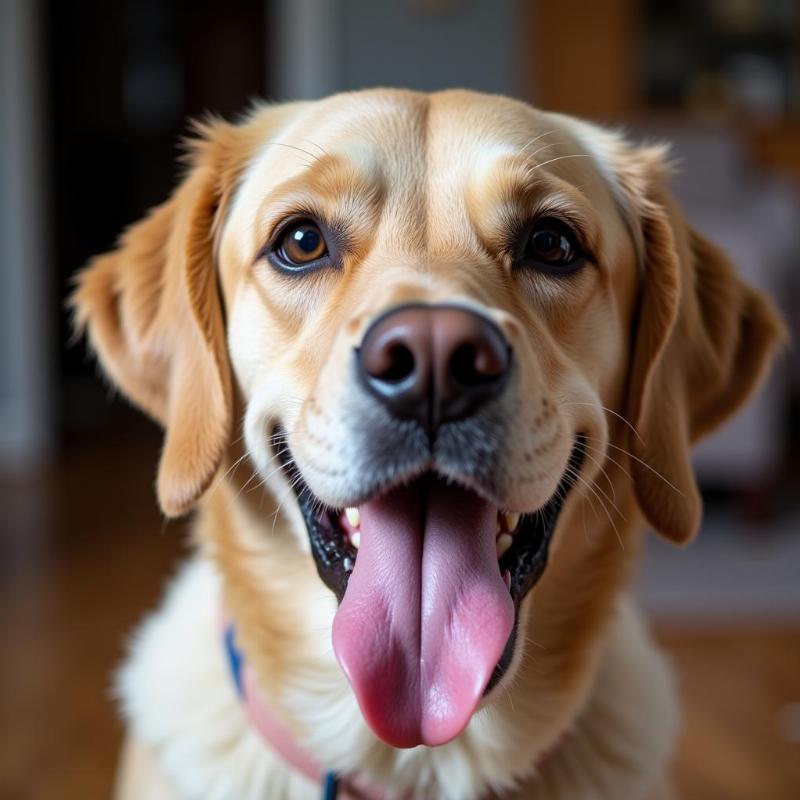Panting is a normal behavior for dogs, a way they regulate their body temperature. But if you’re noticing your older dog panting more than usual, it’s natural to wonder why. While some panting is perfectly normal, excessive panting in senior dogs can signal an underlying health issue. This article will explore the common reasons why your older dog might be panting, when to be concerned, and what steps you can take to ensure your furry friend’s well-being.
Understanding Panting in Older Dogs
As dogs age, their ability to regulate body temperature can become less efficient. This makes them more susceptible to overheating, which leads to increased panting. Panting helps dogs evaporate moisture from their tongues and lungs, cooling them down. However, excessive panting in older dogs can be a symptom of various conditions, ranging from minor discomfort to serious medical problems. Recognizing the difference between normal panting and problematic panting is crucial for providing appropriate care. Is your dog panting after a brisk walk on a warm day? That’s likely normal. Is your dog panting excessively while resting in a cool room? That warrants further investigation.
Common Causes of Excessive Panting in Senior Dogs
Several factors can contribute to excessive panting in older dogs. Some of the most common include:
- Pain: Arthritis, hip dysplasia, and other age-related conditions can cause chronic pain, leading to increased panting. Observe your dog for other signs of pain like limping, stiffness, or reluctance to move.
- Heart Problems: Heart disease is more prevalent in older dogs and can manifest as increased panting, especially during exercise or exertion. Other symptoms might include coughing, lethargy, and difficulty breathing.
- Respiratory Issues: Conditions like pneumonia, bronchitis, and even allergies can make breathing difficult, resulting in panting. Look for signs like coughing, wheezing, or nasal discharge.
- Cushing’s Disease: This hormonal disorder is more common in older dogs and can cause increased thirst and appetite, which can lead to more frequent panting. Other signs include increased urination, hair loss, and pot-bellied appearance.
- Anxiety or Stress: Changes in routine, loud noises, or separation anxiety can trigger stress and anxiety in older dogs, leading to panting. Observe your dog’s behavior and identify potential stressors.
- Obesity: Carrying extra weight puts a strain on an older dog’s heart and respiratory system, making it harder to regulate body temperature and resulting in increased panting.
- Heatstroke: Older dogs are more vulnerable to heatstroke, which is a life-threatening condition characterized by excessive panting, rapid heart rate, and elevated body temperature. Immediate veterinary attention is crucial if you suspect heatstroke.
 Senior Dog Panting Indoors
Senior Dog Panting Indoors
When to Seek Veterinary Care
While occasional panting is normal, you should consult a veterinarian if your older dog is panting excessively, especially if accompanied by other symptoms like:
- Lethargy or weakness
- Loss of appetite
- Increased thirst or urination
- Coughing or wheezing
- Difficulty breathing
- Pale gums
- Collapse
“Early detection is key in managing many health conditions in older dogs,” says Dr. Emily Carter, DVM, a veterinarian specializing in geriatric canine care. “If you notice your senior dog panting more than usual, don’t hesitate to schedule a check-up with your veterinarian.”
Tips for Helping Your Panting Older Dog
- Maintain a Comfortable Temperature: Ensure your dog has access to a cool, shaded area, especially during warmer months. Consider using fans or air conditioning to keep the environment comfortable.
- Provide Fresh Water: Always have fresh, cool water available for your dog. Consider using a raised water bowl for easier access, especially for dogs with arthritis.
- Manage Weight: If your older dog is overweight, work with your veterinarian to develop a safe and effective weight loss plan.
- Reduce Stress: Identify and minimize potential stressors in your dog’s environment. Create a calm and predictable routine.
- Regular Veterinary Check-ups: Regular check-ups are essential for early detection and management of age-related health conditions.
Conclusion
Understanding why your older dog is panting is essential for their overall well-being. While some panting is normal, excessive panting can be a sign of an underlying health issue. By observing your dog’s behavior, being aware of potential causes, and seeking veterinary care when necessary, you can ensure your senior companion enjoys a comfortable and healthy life. Remember, if you are concerned about your older dog’s panting, it’s always best to consult with your veterinarian.
FAQ
- Why is my older dog panting so much at night? Nighttime panting can be related to pain, anxiety, or underlying health issues. Consult your veterinarian.
- Is it normal for an older dog to pant after eating? Occasional panting after eating can be normal, but persistent panting should be investigated.
- Can medications cause panting in older dogs? Certain medications can cause panting as a side effect. Discuss your dog’s medications with your veterinarian.
- How can I tell if my older dog is overheating? Signs of overheating include excessive panting, rapid heart rate, weakness, and collapse. Seek immediate veterinary care.
- What are the signs of heart disease in older dogs? Signs can include coughing, difficulty breathing, weakness, lethargy, and increased panting.
- Can anxiety cause panting in older dogs? Yes, anxiety and stress can lead to increased panting.
- How often should I take my older dog to the vet? Senior dogs should generally have check-ups every six months.
Related Articles
- why is my older dog panting so much
- my old dog drinks a lot of water
- why is my dog taking deep breaths
- why does my dog lay down when i approach him
Beautdogs.us is your premier online destination for all things dog-related in the US. We offer expert advice on dog breeds, grooming, nutrition, training, and healthcare. Whether you’re a seasoned dog owner or just starting out, Beautdogs.us is your trusted source for comprehensive and engaging information on all aspects of dog companionship. Contact us today for personalized advice and support! Email: [email protected], Phone: +1 501-555-7529.